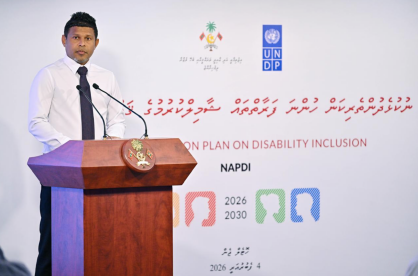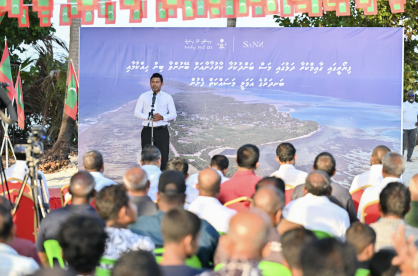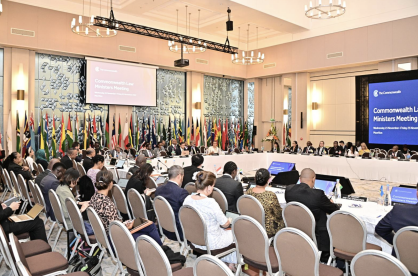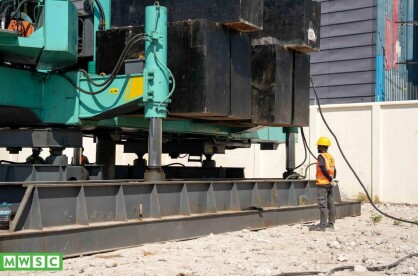Development of Uthuru Thilafalhu (UTF) as a naval dockyard and harbour first came to public attention in August 2013, when then-Minister of Defence Colonel (Retired) Mohamed Nazim inaugurated the project. This was during the administration of President Mohamed Waheed. Speaking at the ceremony, where he was seen operating an excavator to signify the foundation laying of the reclamation component of the project, Nazim said that the project, estimated to cost MVR5 million, was being funded under the Sifainge Welfare Corporation (SIWEC), which had been established to implement such "mega" projects for military welfare. SIWEC is 90 percent owned by soldiers, while the balance 10 percent is held by the government.
Nazim also spoke on the facilities that will be established on the reclaimed land, including a strategic oil reserve, a housing project to cater to needs of soldiers, a residential area to ensure revenue streams and even a resort for tourists. The developments will involve the reclamation of one hectare of land, establishment of a 50 meter harbour and a 30 meter channel. He further said that Thamburudhoo island has also been leased for tourism to ensure a revenue stream for SIWEC to continue its objectives.
The agreement to embark on the project with the inclusion of the Indian Government was made on 21 February 2021. Why and how did a project launched under SIWEC make it to the Maldives' development pipeline with India? In February 2014, Indian Foreign Secretary Sujatha Singh, during a visit to the Maldives, travelled to UTF, where she was shown around by Maldivian defence officials. Nazim as well as the then-Defence Chief Major General Ahmed Shiyam accompanied her on the visit.
Indian Army Chief Bikram Singh also visited the Maldives in May 2014, during the administration of President Abdulla Yameen, and Indian media reported at the time said that the Indian Government had offered to build a naval dockyard in the Maldives valued at USD500 million. Nazim, who was the Minister of Defence at that time, however, denied the report and said that the "job will not be offered to a foreign military."
Several agreements were signed between the Maldives and India during Yameen's visit to India in April 2016, one of which was an Action Plan for Defence Cooperation between the two governments. At a joint press conference Yameen held with Indian Prime Minister Narendra Modi, he said India was "the most important friend for the Maldives," and that the "security of the Maldives is intimately linked with the security of India." Modi, at the press conference said that the defence action plan included "development of ports, continuous training, capacity building, supply of equipment and maritime surveillance." The Indian Prime Minister specifically said in his statement that "India and Maldives will jointly develop port-related facilities at Uthuru Thilafalhu."
The Action Plan included reference to the UTF project and formed the basis of the agreement for the development of a naval dockyard and harbour at UTF under Indian assistance, which was inked on 21 February 2021 by the current government.
The current opposition parties, Progressive Party of Maldives (PPM) and People's National Congress (PNC) have started a campaign against Indian military being stationed in the Maldives. The campaign allegedly started against Indian soldiers and military being involved in the operation of two Dhruv Advanced Light Helicopters gifted by India to the Maldives in 2010 and 2015.
The terms of the agreement around these state that Indian soldiers will be stationed in the Maldives to fly the helicopters and for maintenance. It also specifies that the Indian Government will undertake training of Maldivians to pilot the helicopters, which however, had not been delivered on. Allegations are also rife that India is using radar systems it gifted and installed in the Maldives for its own advantage.
Led by these accusations, the signing of the UTF agreement saw an increase in calls for #IndiaOut, with protests both on the streets and on social media. One should also note that the Maldives had, on 10 September 2020, also signed a "Framework for US Department of Defence-Maldives Ministry of Defence: Defence and Security Relationship" with the United States to "deepen engagement and cooperation in support of maintaining peace and security in the Indian Ocean."
Surprisingly, this pact was signed by Minister of Defence Mariya Ahmed Didi during a private visit to the United States, and no details of the scope of this agreement are known either. The current opposition, however, in its fixation on India, do not appear to be aware, or bothered about this agreement.
The Ministry of Defence, in response to an application under the Right to Information Act has refused to share details on the UTF agreement requested by local newspaper, Dhiyares. It has now, however, made a presentation to the parliament committee on security services (241 committee), following which the chair of the committee, Parliament Member Mohamed Aslam has said that there is nothing in the agreement that poses a threat to national security. It should be noted though, that an actual copy of the agreement is still to be provided to parliament.
The opposition has, however, issued a statement, where it says that the agreement is unconstitutional and while not specifying that Indian military personnel cannot be stationed at the facility, it also allows for India to station any personnel at the facility for the next 15 years. It also states that the facility is to be run by a committee that includes Indian officials, bringing into question whether the Maldivian military will have full control over it — Maldivian military officials however continue to insist that the facility will be fully under Maldivian control.
The public has been kept in the dark on these matters. While the Ministry of Defence is vehement in its refusal to share the details of the agreement, this brings into question what is really in the agreement that warrants such secrecy. If the Indian military is not to be stationed at the facility, why the reluctance to share the information requested? Dhiyares, in its request, has asked for details on the "technical" staff from India who will be stationed at UTF, details of the USD50 million that will be provided under the agreement, as well as other specific details.
The Maldives is not at a state of war with any known nation and is known for its long-standing embrace, at least on paper, of being a Non-Aligned nation. As such a clear and unambigous explanation is owed to the Maldivian people.
It boggles the mind as to what sort of national security might be threatened by discussing the agreement in broad terms with the public but with laws, and the public, willing to let that classification stand in the interest of the nation, the government at the very least needs to properly brief the national security contingent of the parliament on the issue in detail — the agreement needs to be shared in secure, closed quarters, and any confusion addressed — and this needs to include at the very least opposition MPs who are part of the parliament committee on security services, preferably other opposition MPs; at least one from every party, and perhaps even all independents, so that, at this point, it is made abundantly clear to the public that the agreement does not impact the standing of the Maldives as a sovereign, independent nation.






